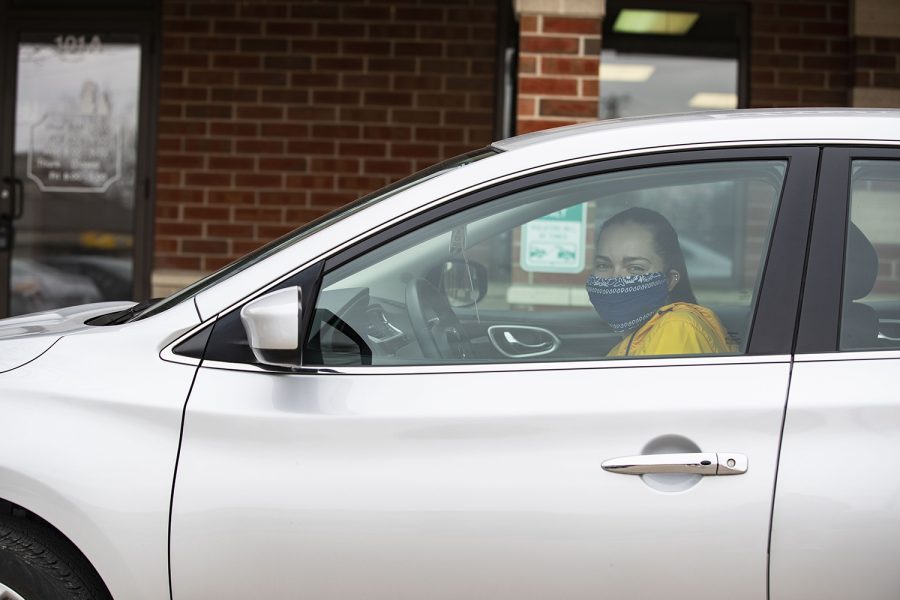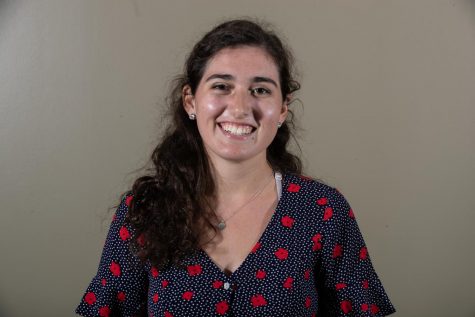Hawks helping hawks: Iowa City Errand-ers deliver groceries to those at risk for COVID-19
Hundreds of Iowa City volunteers are helping to run errands for those especially vulnerable to falling severely ill from the novel coronavirus.
UI junior Madison Schulte poses for a portrait outside of Kennedy Plaza on Tuesday, April 7, 2020. Schulte was on her way to her first run for the Iowa City Erranders, who work to run errands for the elderly or immunocompromised. (Katie Goodale/The Daily Iowan)
April 9, 2020
When Allie Stutting saw a Twitter post in early March about an elderly couple that was too scared to go inside a grocery store because of the risk of COVID-19, the University of Iowa senior brainstormed how she could help those who are especially vulnerable to the disease.
The tweet made Stutting think of the risk that her own grandparents faced, as research shows the elderly and people with underlying health conditions are particularly susceptible to falling severely ill or dying from the disease caused by the novel coronavirus. She decided she wanted to create a network where people could volunteer their time to help individuals who felt unsafe during the pandemic.
Soon after, Stutting created Iowa City Errand-ers, a group that aims to help elderly and immunocompromised individuals get groceries and other essential items amid the COVID-19 pandemic. “Hawks help hawks” rang true as she received a “massive response” from people eager to band together to help when she tweeted a call to the community for volunteers.
Stutting formed Iowa City Errand-ers because she wanted to help the community during this time of crisis, she said.
“The fact that over 400 people expressed interest in volunteering really shows the culture in our city, and especially within our student body population. People are so eager to give back and I think IC Errand-ers has really embodied that,” Stutting said. “The coolest thing that has come out of this is [seeing] just how willing and eager people are to step up and help out our community.”
She said volunteers sign up through the Iowa City Errand-er’s website and must complete mandatory training sessions that adhere to Johnson County Public Health’s guidelines before running the errands. All volunteers are also required to wear gloves while on an errand run and drop the errand items off, instead of giving it to clients directly, to minimize any direct contact, Stutting said.
RELATED: Iowa City grocers make changes to stay open during COVID-19 pandemic
Stutting ran the organization’s first errand April 3, and there have been four others since then, said Iowa City Errand-er’s Public Relations Director Cesar Perez. The organization is currently working to expand its reach to more clients, he said, but has encountered obstacles with older generations accessing online and social-media platforms.
The biggest hurdle, Perez said, has been the limited number of payment options that clients can use to reimburse volunteers for the errand expenses.
“It’s a wall that we’re facing,” he said. “Older people don’t really have Venmo or Cash App or anything like that, so we’re trying to figure out how we can help [clients] download the apps because the last thing that people want to deal with right now is cash.”
Iowa City Errand-ers International Student Outreach and Support Director Maddie Schulte said everything besides the issue of payment has gone smoothly, and the organization is getting more errand submissions every day.
Schulte completed an errand run April 7, and she said it was a simple process. The client completed a Hy-Vee Aisles Online grocery order and paid for it in advance, so Schulte just picked the groceries up and dropped them off inside the client’s garage.
“[The client] was very grateful for the service because he didn’t feel like he could go out in the community right now,” Schulte said. “He also said that he appreciated the amount of time that we took to develop a food system and [create rules that] limit the interaction [between the clients and volunteers].”















